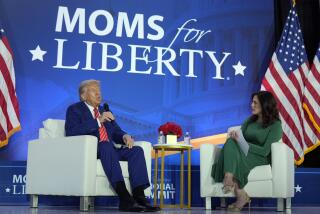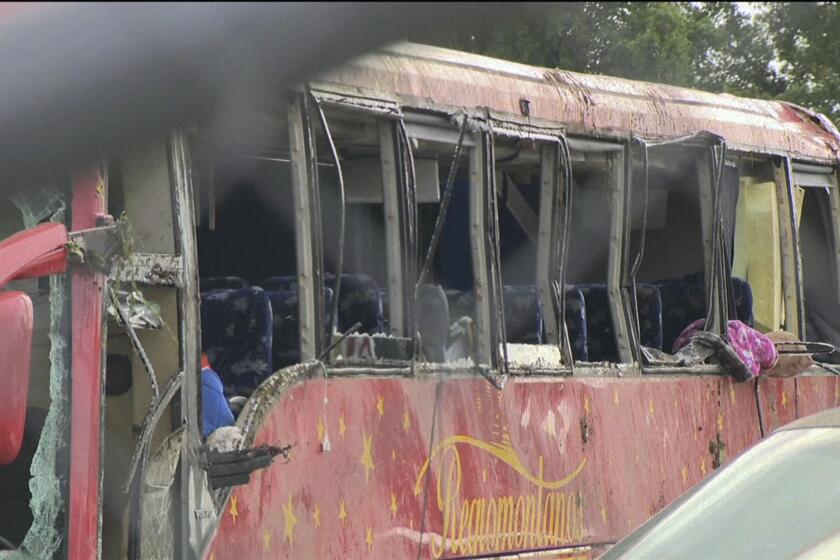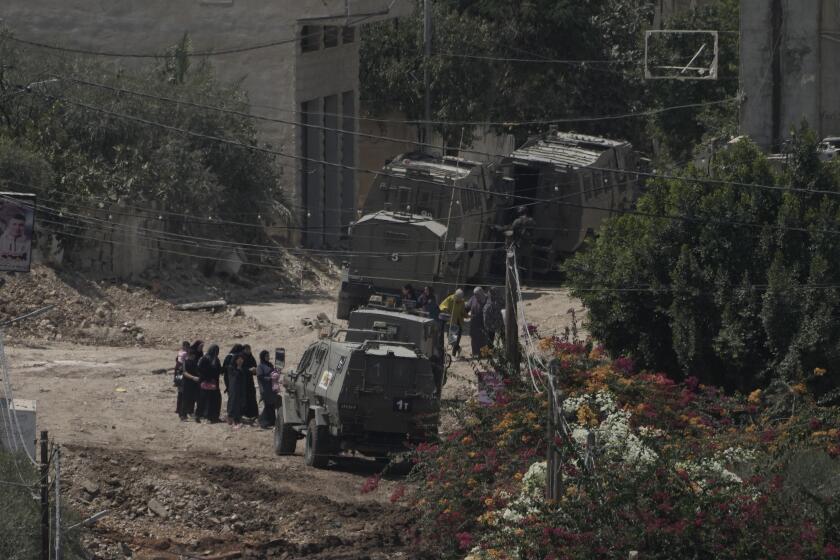KPFK Takes a Different Tack on War Reports : Radio: The Pacifica station is offering live coverage of peace demonstrations, debates on peace movement strategies, and discussions on the impact of the war on children.
KPFK-FM (90.7) can’t do much to break through what it calls the Pentagon’s control of information about the war with Iraq, so instead it has decided to cover peace.
“We are an alternative voice,” said Alan Fong, KPFK’s general manager. “We are not able to be in Riyadh or Amman or Baghdad except through stringers, so we choose certain subjects like peace as a way of informing people about things that they might not be able to find elsewhere.”
While listeners to the station’s five daily newscasts hear about the nuts-and-bolts statistics emanating from daily military briefings in Washington and Saudi Arabia--the body counts and number of sorties flown that are readily available from myriad television and radio outlets--KPFK listeners are also getting live, multihour coverage of peace demonstrations across the country, debates on what’s wrong and what’s right with the thinking and strategies of the current peace movement, and discussions on the impact of war on children.
As part of the five-station Pacifica radio network, KPFK’s mission--as stated with the founding of the first Pacifica station in Berkeley in 1949--has always been to promote understanding between different cultures and nations and to attempt to break down the barriers created by governments.
Funded primarily by about 14,000 active subscribers/listeners, KPFK operates on an annual budget of about $900,000. “We can get by on less than the cost of one of those Tomahawk cruise missiles,” said Harlan Rotblatt, special assistant to the program director for Gulf coverage.
In normal times, KPFK’s programming leans to the left, providing a forum for people of color, labor organizers, environmentalists and peace groups on a regular basis. It was the only local station to air the entire “Keating Five” savings-and-loan ethics hearings last fall. And with war waging in the Middle East, it is no surprise that the station would show a predilection for presenting an anti-war, anti-Bush Administration perspective.
“If we don’t give voice to such things as peace marches,” Rotblatt said, “who will? We don’t have the resources to unearth any special insight into the decision-making process or how the actual battle is going, but we are able to enlarge the spectrum of the debate.”
That translates into airing programs about the strengths and failings of the United Nations as well as scorching criticisms of President Bush’s State of the Union address last week. It means reading aloud a Progressive magazine profile of Gen. H. Norman Schwarzkopf, the commander of the coalition forces in the Gulf, that offers a less flattering portrayal of the general’s background and temperament than those that have popped up elsewhere.
Wednesday at 3:30 p.m., the station plans to broadcast a discussion on the economic costs of the war in terms of the lost opportunities to address pressing social problems at home.
Though the station has not blown out its regular schedule of music, news and discussion programs to cover the war, many of KPFK’s shows have nonetheless adopted war and peace-related themes, such as cracks in the nuclear non-proliferation pact and finding alternative energy sources. And the daily Pacifica newscasts from Washington, while covering news from the White House, the Pentagon and the Middle East battlefields, also include pieces on such topics as the long-term environmental consequences that the massive troop deployment in Saudi Arabia and the bombing of nuclear and chemical facilities in Iraq will have on the Middle Eastern desert.
“We want to examine the peace movement, but the peace movement is not all of peace that needs to be addressed,” said Lucia Chappelle, KPFK’s program director. “When you’re talking about the causes of conflict, you begin to really see what the solutions are. It’s not four Patriots vs. five Scuds. We need to zero in on dealing with possible solutions for the problems of the region because that’s what you’re hearing less and less of. That’s where we can really fill a gap.”
That means taking the discussion away from all the military experts that have dominated television coverage of the war and handing the microphone to scholars and experts on Middle Eastern history and geopolitical issues, Chappelle said.
KPFK managers are careful not to denigrate the mainstream media’s coverage of the war, conceding that other outlets have attempted to tell a fairly broad story, considering the limitations they face from military censors on all sides. But Rotblatt argued that the problem in this war, as in any war, is that it is difficult for the press to resist identifying with and communicating the worthiness of the government’s purpose, especially when the lives of American soldiers are threatened by Scud missiles and artillery fire.
“They get caught up in the ‘us vs. them’ mentality and tend to report those soldiers’ victories as our victories,” he said. “And it is a sobering idea that the press so easily fails to separate itself from the value system of the war. And to the extent that any news or public-affairs medium can do that, can pull itself back and give a louder voice or more critical voice, then it’s fulfilling the soul of the mission that news and public affairs is supposed to embrace. And that, I think, is what we’re trying to do.”
More to Read
Sign up for Essential California
The most important California stories and recommendations in your inbox every morning.
You may occasionally receive promotional content from the Los Angeles Times.






